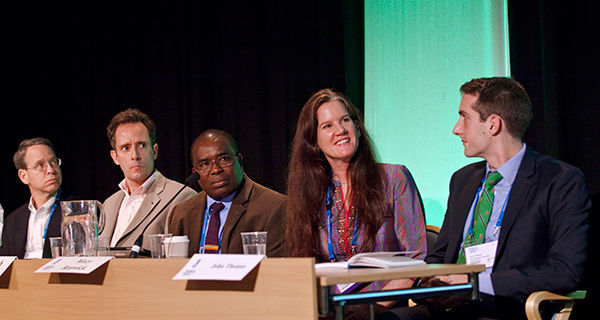Article by Edmund J. Cain, Former Vice President, Grant Programs
This year at World Water Week, the Conrad N. Hilton Foundation led a well-attended session, “Catalyzing Funding, Innovation, and Advocacy: U.S. Philanthropy and WASH.”

In the United States, foundation funding for water, sanitation, and hygiene (WASH) has increased noticeably in the last 10 years, but it is still a very small portion of donations for international issues. U.S. foundations contribute only one percent—a drop in the bucket—of the overall investment.
Instead, the majority of the resources come from countries themselves, followed by official development and multilateral assistance. The challenge for U.S. foundations is how to use our one percent contribution in an effective and catalytic way to leverage more resources, foster innovation, and improve collaboration.
This year at World Water Week, the Conrad N. Hilton Foundation led a well-attended session, “Catalyzing Funding, Innovation, and Advocacy: U.S. Philanthropy and WASH.”
World Water Week—an annual event held in Stockholm—is the leading global meeting for people working in the field of water and development. It promotes an exchange of views and experiences between the scientific, business, policy, and civil society communities with the goal of advancing water, environment, health, livelihood, and poverty-reduction agendas. Each year, the conference draws over 2,000 participants, including key decision makers, and more than 200 organizations.
Our panel discussion featured donors from the Bill & Melinda Gates Foundation, the Hilton Foundation, The Skoll Foundation, and The Rockefeller Foundation. Also participating were grantees supported by these foundations, including Water For People, WASH Advocates, CARE, Catholic Relief Services, and Winrock International. The speakers presented case studies and engaged in dialogue about the successes and challenges of their respective programs. We’re grateful to everyone who joined us for this full-house seminar.
One of the tools we’ve supported, in order to leverage philanthropy’s modest yet influential contribution to this sector, is the Foundation Center’s online portal, WASHfunders.org, which shows the breadth of water, sanitation, and hygiene funding around the world by private foundations, and bilateral and multilateral aid agencies. This unique resource acts as a “one-stop shop” for funding and needs-related data for donors, policymakers, and other stakeholders.
During our panel discussion in Stockholm, Brad Smith, President of the Foundation Center, said, “The important thing is the [philanthropic] sector is growing. It is growing every year, with more foundations created every year than go out of business. There are over 800 foundations in the U.S. that fund outside the borders of the country. We just need to increase the percentage going to WASH.”
We couldn’t agree more.